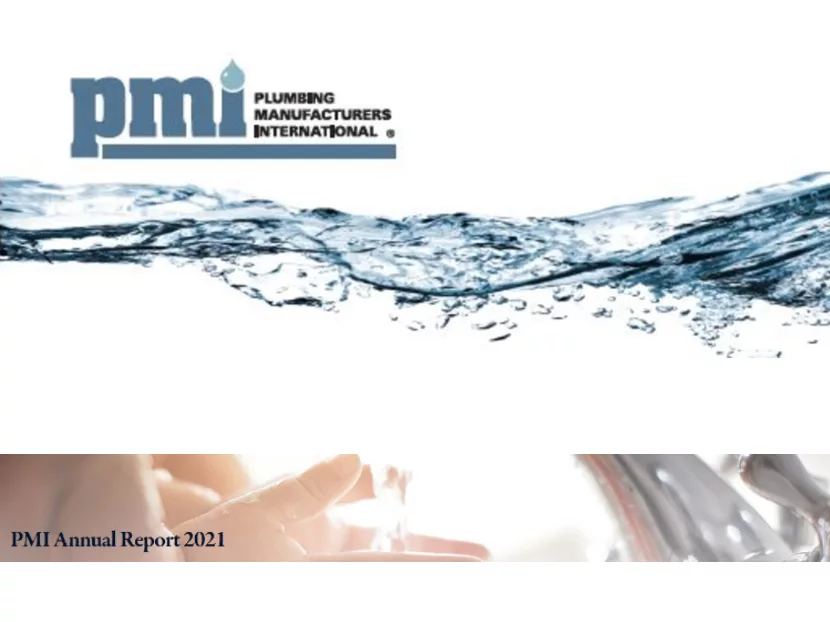"How do we make sure our industry is available?" Plumbing Manufacturers International (PMI) CEO and Executive Director Kerry Stackpole remembers asking this question as the COVID-19 pandemic began to cause business shutdowns and stay-at-home orders.
PMI's efforts to have plumbing manufacturers designated as essential businesses by the federal government were successful, allowing PMI member companies to keep production lines moving, sustain employment, and contribute to the national effort against a deadly virus.
The 2021 PMI Annual Report tells the story of a vital industry and explores how the pandemic year transformed five aspects of plumbing manufacturing: workplace safety, remote working, product innovation, supply chain, and diversity and inclusion.
1. Workplace safety
To keep workers safe, LIXIL implemented a policy to quarantine any employee exposed to potential COVID-19 infection from the workplace for 14 days, with full pay. Because of the shortage of COVID-19 testing, LIXIL chooses not to wait for a positive test, instead quarantining individuals who exhibit symptoms or who are found via contact tracking to be near others who test positive. "It was tough because we had to send home (many) people, but the long-term thinking was that it kept the rest of our people safe and kept our plants operating," stated Chris Marozzi, leader of employees' health and safety for LIXIL Americas.
2. Remote work
Kohler Co. observed many positive consequences of shifting into remote work. "We saw an increase in the use of collaboration technology," said Brian Kendall, Kohler's director of operational excellence. "Interactions grew significantly as we got better at it. Our decision-making improved, with colleagues being able to make decisions in real time, driving productivity gains and results." Adam Guenther, Kohler's associate director, operational excellence, said the company was surprised at "the intensity of work people were able to do from home. There was little to no loss in productivity because people were able to generate an increased number of work hours compared to where they were before," to the point where the company encouraged employees to place boundaries on their work lives, he stated.
3. Product innovation
While causing challenges on production lines and causing a shift to remote work, the COVID-19 pandemic created opportunities for the plumbing manufacturing industry to address a newfound concern many people now have: the spread of infectious viruses.
This change in public awareness has caused a spike in the sales of touchless plumbing products, with many PMI member companies reporting increased sales of both faucets and toilets with touchless features. "Touch-free is everywhere. It's in every conversation. That's foremost in driving many of the innovation efforts at Bradley and throughout the industry," stated Nate Kogler, senior director of product management at Bradley Corp.
4. Supply chain
Rapid and unexpected developments caused by the pandemic have forced companies to monitor their supply chains continuously. "I have to look at all the raw materials that we need to make a product," stated Elton Perkins, director, global sourcing and distribution, Fluidmaster, Inc., and co-chair of PMI's Commerce Committee. "How many sources do I have for ABS (acrylonitrile butadiene styrene) or polypropylene, for example? Do I have enough qualified sources in my spec, so that if one supplier shuts down, I can choose a second? Frankly, I'm having to go three to four deep on various raw materials and qualifying a backup, and backup to backups, of suppliers to critical raw materials. And it's constant."
5. Diversity and inclusion
As race and social justice issues took center stage after the murder of George Floyd, PMI member UL stepped up its diversity and inclusion (D&I) efforts to support its colleagues. "What we experienced last year was this eye-opening, this awakening for corporate America," said Katrina Jackson, UL's global head of diversity and inclusion. While UL had already established a formal "D&I ecosystem" with executive and leadership councils, global ambassadors and internal business resource groups, Jackson said the company wanted to be more transparent and set out to advance equity and achieve measurable progress. UL's D&I team worked with the corporate sustainability group to establish a matching program for racial justice to impact the Black community overall.
The report is prefaced by a letter from PMI Board of Directors President Todd Teter from House of Rohl and PMI Immediate Past President Joel Smith from Kohler Co. Read the entire report at https://www.safeplumbing.org/communications/pmi-annual-report-2021.




